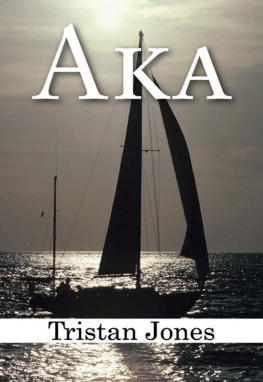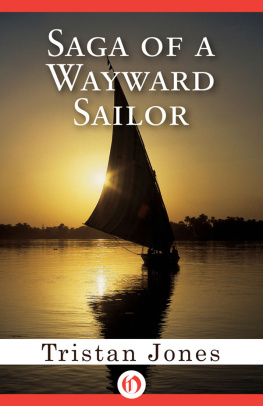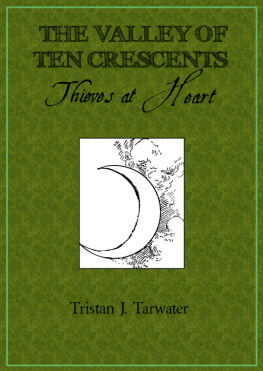Tristan Jones - AKA
Here you can read online Tristan Jones - AKA full text of the book (entire story) in english for free. Download pdf and epub, get meaning, cover and reviews about this ebook. year: 1981, publisher: ereads.com, genre: Detective and thriller. Description of the work, (preface) as well as reviews are available. Best literature library LitArk.com created for fans of good reading and offers a wide selection of genres:
Romance novel
Science fiction
Adventure
Detective
Science
History
Home and family
Prose
Art
Politics
Computer
Non-fiction
Religion
Business
Children
Humor
Choose a favorite category and find really read worthwhile books. Enjoy immersion in the world of imagination, feel the emotions of the characters or learn something new for yourself, make an fascinating discovery.
- Book:AKA
- Author:
- Publisher:ereads.com
- Genre:
- Year:1981
- Rating:3 / 5
- Favourites:Add to favourites
- Your mark:
- 60
- 1
- 2
- 3
- 4
- 5
AKA: summary, description and annotation
We offer to read an annotation, description, summary or preface (depends on what the author of the book "AKA" wrote himself). If you haven't found the necessary information about the book — write in the comments, we will try to find it.
AKA — read online for free the complete book (whole text) full work
Below is the text of the book, divided by pages. System saving the place of the last page read, allows you to conveniently read the book "AKA" online for free, without having to search again every time where you left off. Put a bookmark, and you can go to the page where you finished reading at any time.
Font size:
Interval:
Bookmark:
Non-Fiction
Copyright 1981 Tristan Jones
Published by E-Reads. All rights reserved.
ISBN 10: 0-7592-4767-6
ISBN 13: 978-0-7592-4767-3
To Dagon, for the dolphins, that they may be spared
further slaughter by man.
Da cael ynys mor mawr.
(It is good to find an island in an ocean.)
Cyrys ar Yale (Welsh bard)
The Red Book of Talgarth (A.D. 1400).
(Dagon was the main god of the Philistines, and later
of the Phoenicians. He was represented with the upper
part of a man and the tail of a dolphin.)
Antigua, Guadaloupe, Santo Domingo, Copenhagen, and Manhattan
JanuaryDecember 1980
THIS STORY is not told only for ocean-yacht-racing enthusiasts, nor only for experts, nor only for perfectionists in any field.
My tale is told also for those who have never stepped on board an ocean-sailing vessel, who have never known the elation of running free before the wind under a star-laden sky, who have rarely seen our wonderful relatives, the mammals of the sea, except in captivity.
If my tale can bring to people ashore a little of the joy, a little of the elation and wonder, and even a mite of the pain and suffering that voyagers and other mammals know at sea, then any carping of pierhead critics will be to this book as the squeaks of an unoiled sheet-block are to a vessel safely at anchor in her own quiet haven.
To Professor Charles H. Hapgood, author of Maps of the Ancient Sea Kings (E. P. Dutton)
To Surgeon Commander F. St. C. Golden, Royal Navy, senior medical officer (survival medicine), Institute of Naval Medicine, Alverstoke, England, for valuable information on the effects of immersion of a human in seawater for a prolonged period
To Lieutenant Colonel Peter Thomas, Royal Marines (Ret.), Secretary, Royal Naval Sailing Association, Portsmouth, England, for his patience and assistance in making valuable contacts.
To International Marine Paint Company, New Jersey, for information on cupreous traces in seawater.
To the members of the Atlantic Society, for their faith in the past and hope for the future.
To the survivors of the last warship of the World War II Polish navy, who lent me the hallowed name of their ship, Blytskwtska; for their superb examples in gallantry.
Tursiops truncatus, a subspecies of the family Delphinidae, of the order Ceteacea, is known to sailors as the bottle-nosed dolphin. In North America some landsmen call them the common porpoise.
THE LONGEST AKAS DOLPHIN TRIBE ever stays in one area is when the females give birth. All through their history, as long as the legends of their Wise Ones reached back, their calves had been born in the warm waters that wash the two lonely rocks in the equatorial mid-Atlantic.
Aka and the Wise Ones, in the tale-telling times, transmit holographic images to the rest of the 143 bottle-nosed dolphins in the tribe of how their home had once been, before the seas rose and covered all but the two tiny islets, the very top of the highest peak of the beautiful land that had been Atlantis, the home-island of the Sea Kings. The Atlanteans had been different from modern Man, say the Wise Ones. True, they had fished, but they had never harmed or purposely murdered the dolphins. On the contrary, the Sea Kings had learned to communicate with them, and had included the dolphins in their pantheon of gods, and in return the dolphins had herded the fish for the Atlanteans and accompanied the Sea Kings on their voyages of trade and exploration.
Eventually, after eons of time, the waters had swiftly risen and it had been time for the last of the Sea Kings to leave once-lovely Atlantis in the warm seas. On their long graceful ships with purple sails the Sea Kings had figureheads of dolphins cast in gold, and as they hauled their anchors for the last time their high priest had made a vow that when they reached their new home in the inland sea, they would raise a temple which would be the new center of the world and they would name it in honor of their sea gods. Eh-ee, the name of the temple, had come down in the dolphin legends through twelve thousand years and twelve thousand treks around the North Atlantic Ocean. It was the closest the dolphins could come to pronouncing the human word Delphi.
Each August, when the calves are two to three months old, the dolphins of Akas tribe leave the lonely rocks, now known to humans as St. Pauls, and make their way, by taste and their guiding stars, into the west-flowing Guinea Current, warm after its long traipse up the west African coast. They do not hurry. The fish scouts and the shoal herders range up to a hundred miles either side of the main body of 112 dolphins. After two months in the warm Guinea Current, they join the North Equatorial Current, which flows down the coast of Africa from the north and swings west across the ocean to the West Indies. The tribe roams around the West Indies Islands for three months; there the fish abound from October to December. Then it is time to move northeast, into the Gulf Stream. It takes the tribe four months to make its way east across the North Atlantic, ranging north almost as far as Iceland, to their traditional landfall of Cape Finisterre, the northwest tip of Spain. From then on, as they continue south, is their mating time, from Finisterre to the Moroccan coast.
From Finisterre, the dolphins steadily make their way south during March and April, south in the cool Portugal current, in a vast area which extends right down the coast of Portugal, across the herring, cod, and pilchard-teeming Straits of Gibraltar, right down to the coast of Mauritania, where the shoals of mullet darken the oceans like undersea clouds. They do not swim along in a direct route, but range as far west as Madeira and the Canary Islands, and sometimes they even visit into the Mediterranean as far east as the Balearic Islands and Corsica; but, by their ancient law, no further.
By mid-April each year the tribe has plowed its way through the Cape Verde Islands and, always with several females heavy with calf from the previous years mating, heads southwest by south, right across the Guinea Current again, in a line as straight as an arrow, guided as always by their taste and the stars, back to the two lonely warm islets and the safe inlet, which is all that remains of Atlantis, which has always been their ancestral home, ever since the dawning of their recorded history twenty million years ago.
Conan reread the telegram, picked up the phone, and as he dialed, reminded himself not to mention the name Josephine. Outside, the New York traffic roared.
Ruth, he said in a slight Scottish burr, I want to see you urgentlyno, I dont want to discuss it on the phoneI have to go away for a while
He listened for a moment, then he said, Okay, Formellis then, at seven. He waited for another minute, listening. Then he smiled and murmured, I love you, too, and hung up the phone.
Conan picked up the cable again and scanned it. His hand shook as he read it, then he groaned quietly to himself and let the cable fall onto his desk. He was in corduroy pants and shirt sleeves. He was of medium build, sinewy yet not thin, with thinning dark hair and trimly shaped graying beard. He held his head slightly thrust forward, as if he were sniffing the air. His gray eyes were now half-closed in shock and sorrow.
For a few minutes he stared out of his fifth-floor apartment window at the Seventh Avenue traffic rumbling below. As Conan stood at the window he held both feet planted apart, as if he were on the deck of a ship at sea. Every move he made, even as he turned his head to look along the avenue, was as decisive as if it had been considered beforehand. He had the look of a man who is accustomed to making up his mind and acting upon his decisionthe kind of man whose obvious inner strength is, when all is well, resented by weaker beings. He was the rare kind of person who was disbelieved in by those who had no inkling of the furnace in which Conans strength had been forged.
Font size:
Interval:
Bookmark:
Similar books «AKA»
Look at similar books to AKA. We have selected literature similar in name and meaning in the hope of providing readers with more options to find new, interesting, not yet read works.
Discussion, reviews of the book AKA and just readers' own opinions. Leave your comments, write what you think about the work, its meaning or the main characters. Specify what exactly you liked and what you didn't like, and why you think so.








